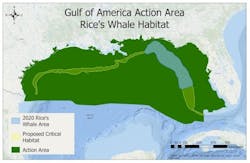New NMFS opinion on oil, gas operations includes jeopardy finding for Rice’s whale
Vessel strikes from oil and gas operations in the US Gulf could push the Rice’s whale to extinction, but mitigation efforts could allow operations while still protecting the endangered species, the US National Marine Fisheries Service (NMFS) said May 20.
NMFS issued a new biological opinion on the effects of oil and gas development in the area the day before a court deadline that threatened continued activity.
“It is NMFS’ biological opinion that the proposed action is likely to jeopardize the continued existence of the Rice’s whale” because of vessel strikes, making it a violation of the Endangered Species Act,” NWFS said.
But a reasonable and prudent alternative (RPA) involving the development of new technology to detect the whales, speed limits, and a requirement to keep a 500-m distance if a whale is spotted, would reduce the threat to acceptable levels because it would make lethal vessel strikes “extremely unlikely to occur," NMFS said.
NMFS was required to complete this new biological opinion after a federal court in Maryland found the 2000 biological opinion on Gulf oil and gas activities, effective May 21, 2025, was unlawful. The court found that NMFS did not adequately assess the effects of vessel strikes and oil spills on endangered species. It said it would vacate the opinion, potentially imperiling oil and gas operations (OGJ Online, Aug. 21, 2024).
“This reinitiated biological opinion replaces the 2020 opinion in its entirety...and makes changes fully addressing each of the court’s findings of error in the [earlier] opinion,” NMFS said.
Reactions
Four conservation groups, the original plaintiffs in the case, filed a lawsuit, saying the NMFS’ opinion, required under the Endangered Species Act, was inadequate to properly protect both Rice’s whales and Kemp’s Ridley sea turtles.
In the newly released opinion, NMFS said the whale species, which number between 50-100, was the only species threatened by oil and gas activities. The opinion evaluated the effects of such activities on not only the Rice’s whale and Kemp Ridley turtles, but also loggerhead, leatherback, hawksbill and green sea turtles, as well as sperm whales, Gulf sturgeon, whitetip sharks, giant manta rays, and an array of less-threatened species.
“Despite the previous court decision, the Fisheries Service continues to turn a blind eye to the risks that offshore oil and gas pose to the Gulf’s environment and imperiled species,” said Earthjustice senior attorney Chris Eaton.
The American Petroleum Institute (API) and the National Ocean Industries Association (NOIA) hailed the opinion.
“The biological opinion provides a necessary foundation for oil and natural gas operations in the Gulf of America, and a gap between opinions would significantly slow down or halt all permits for routine, daily operations,” API vice-president of upstream policy Holly Hopkins said in a statement.
NOIA, while lauding the opinion, expressed concerns about restrictions to protect the Rice’s whale.
“As we continue reviewing the new opinion, we are concerned by the inclusion of a jeopardy finding for the Rice’s whale,” said NOIA president Erik Milito. “That determination appears inconsistent with the best available science and triggers unnecessary regulatory uncertainty.”
In 2023, the Biden administration agreed to exclude the Rice's whales’ habitat from any lease sales and require oil and gas-related vessels to reduce speed to 10 knots when traveling through the whale's defined habitat.
The Bureau of Ocean Energy Management, which manages lease sales in the Outer Continental Shelf, added those stipulations in its proposed September 2023 Lease Sale 261, but the oil and gas industry successfully fought to remove the protections from the sale. The legal cases delayed the lease sale until December 2023 (OGJ Online, Dec. 4, 2023).
About the Author
Cathy Landry
Washington Correspondent
Cathy Landry has worked over 20 years as a journalist, including 17 years as an energy reporter with Platts News Service (now S&P Global) in Washington and London.
She has served as a wire-service reporter, general news and sports reporter for local newspapers and a feature writer for association and company publications.
Cathy has deep public policy experience, having worked 15 years in Washington energy circles.
She earned a master’s degree in government from The Johns Hopkins University and studied newspaper journalism and psychology at Syracuse University.
